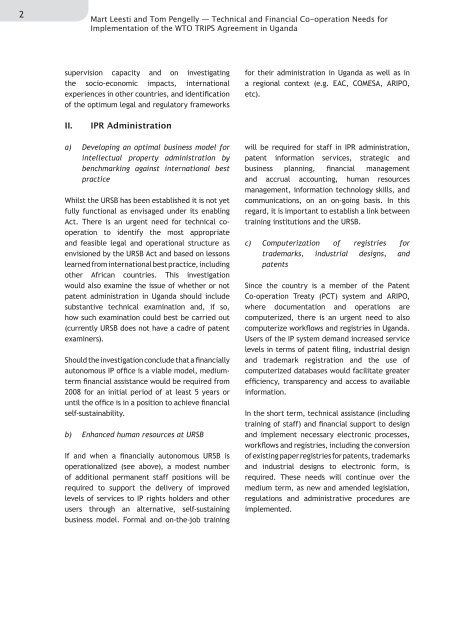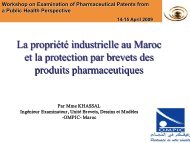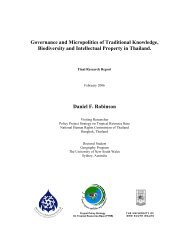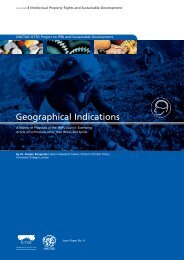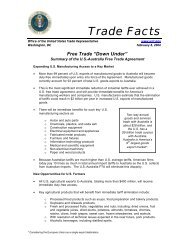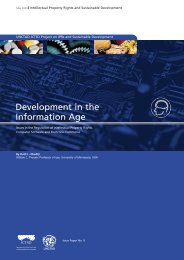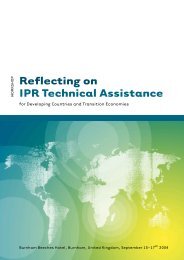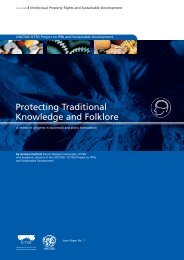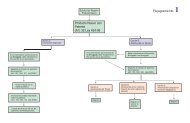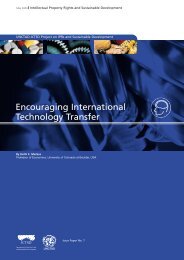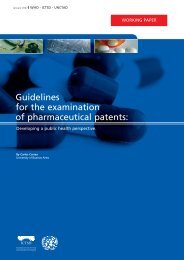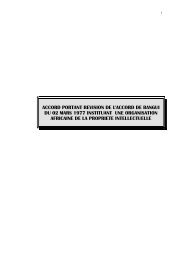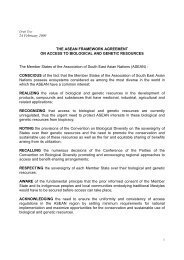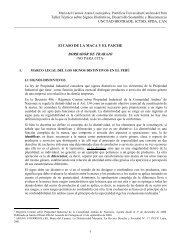Final Report of Uganda Intellectual Property ... - IPRsonline.org
Final Report of Uganda Intellectual Property ... - IPRsonline.org
Final Report of Uganda Intellectual Property ... - IPRsonline.org
Create successful ePaper yourself
Turn your PDF publications into a flip-book with our unique Google optimized e-Paper software.
2<br />
Mart Leesti and Tom Pengelly ― Technical and Financial Co-operation Needs for<br />
Implementation <strong>of</strong> the WTO TRIPS Agreement in <strong>Uganda</strong><br />
supervision capacity and on investigating<br />
the socio-economic impacts, international<br />
experiences in other countries, and identification<br />
<strong>of</strong> the optimum legal and regulatory frameworks<br />
for their administration in <strong>Uganda</strong> as well as in<br />
a regional context (e.g. EAC, COMESA, ARIPO,<br />
etc).<br />
II.<br />
IPR Administration<br />
a) Developing an optimal business model for<br />
intellectual property administration by<br />
benchmarking against international best<br />
practice<br />
Whilst the URSB has been established it is not yet<br />
fully functional as envisaged under its enabling<br />
Act. There is an urgent need for technical cooperation<br />
to identify the most appropriate<br />
and feasible legal and operational structure as<br />
envisioned by the URSB Act and based on lessons<br />
learned from international best practice, including<br />
other African countries. This investigation<br />
would also examine the issue <strong>of</strong> whether or not<br />
patent administration in <strong>Uganda</strong> should include<br />
substantive technical examination and, if so,<br />
how such examination could best be carried out<br />
(currently URSB does not have a cadre <strong>of</strong> patent<br />
examiners).<br />
Should the investigation conclude that a financially<br />
autonomous IP <strong>of</strong>fice is a viable model, mediumterm<br />
financial assistance would be required from<br />
2008 for an initial period <strong>of</strong> at least 5 years or<br />
until the <strong>of</strong>fice is in a position to achieve financial<br />
self-sustainability.<br />
b) Enhanced human resources at URSB<br />
If and when a financially autonomous URSB is<br />
operationalized (see above), a modest number<br />
<strong>of</strong> additional permanent staff positions will be<br />
required to support the delivery <strong>of</strong> improved<br />
levels <strong>of</strong> services to IP rights holders and other<br />
users through an alternative, self-sustaining<br />
business model. Formal and on-the-job training<br />
will be required for staff in IPR administration,<br />
patent information services, strategic and<br />
business planning, financial management<br />
and accrual accounting, human resources<br />
management, information technology skills, and<br />
communications, on an on-going basis. In this<br />
regard, it is important to establish a link between<br />
training institutions and the URSB.<br />
c) Computerization <strong>of</strong> registries for<br />
trademarks, industrial designs, and<br />
patents<br />
Since the country is a member <strong>of</strong> the Patent<br />
Co-operation Treaty (PCT) system and ARIPO,<br />
where documentation and operations are<br />
computerized, there is an urgent need to also<br />
computerize workflows and registries in <strong>Uganda</strong>.<br />
Users <strong>of</strong> the IP system demand increased service<br />
levels in terms <strong>of</strong> patent filing, industrial design<br />
and trademark registration and the use <strong>of</strong><br />
computerized databases would facilitate greater<br />
efficiency, transparency and access to available<br />
information.<br />
In the short term, technical assistance (including<br />
training <strong>of</strong> staff) and financial support to design<br />
and implement necessary electronic processes,<br />
workflows and registries, including the conversion<br />
<strong>of</strong> existing paper registries for patents, trademarks<br />
and industrial designs to electronic form, is<br />
required. These needs will continue over the<br />
medium term, as new and amended legislation,<br />
regulations and administrative procedures are<br />
implemented.


